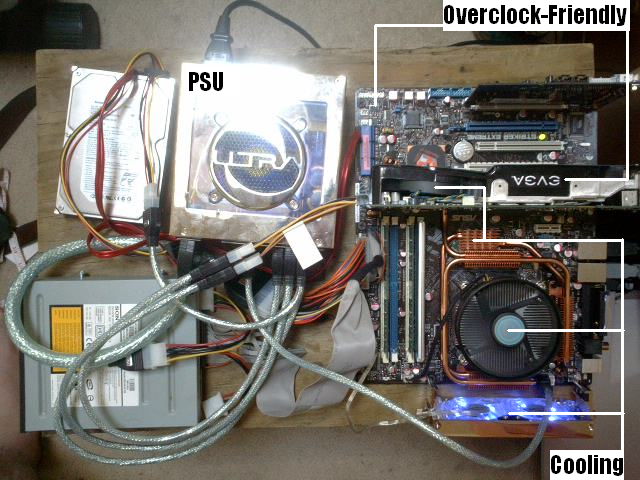
There are a few very important things that must be considered before one undertakes any overclocking process. First and foremost, overclocking anything makes is generate more heat than it otherwise would, or than it otherwise was intended to. This makes sufficient cooling very important to the would be overclocker, as without it permanent damage is an inevitability. Methods of cooling vary considerably, from simple mechanical fans (whereby noise then becomes a factor) to very complicated radiator and liquid cooling designs, to even more complicated liquid nitrogen and oil-submersion set ups. Basically, though, it boils down to this: the colder you can keep your system, the more potential there is for overclocking (to a certain extent).
Another, equally important aspect of overclocking is the power supply unit (PSU), as faster clocks require higher voltages, and if there is not enough power supplied to meet these increased demands, all kinds of system instabilities can rear their ugly heads, resulting in anything from annoying glitches to the creation of a very expensive brick (AKA, a broken computer). Unlike cooling systems, though, higher wattage PSU’s do not directly correlate to better performance, rather, they operate more on an “all-or-nothing” principle, meaning that unless problems are being had because of insufficient power, upgrading the PSU is not generally recommended (it can never really hurt though).
Last but not least, it is important to realize that some hardware is more easily overclocked than others. Most mass produced consumer PC’s, for example, actually have measures in place to completely prevent any level of FSB overclocking, and also, there are many graphics cards that were never intended for gaming in the first place, usually taking the form of a GPU that has been incorporated into the motherboard (usually called an “integrated solution,” I just call them pieces of crap). There are ways to get around some of these safety measures (usually involving flashing the system bios), but they are very risky, and the way I see it, if you are the unfortunate owner of one of these systems, you have no business overclocking in the first place. So, to get to the point, overclocking is only really effective/possible if you have a motherboard that allows it, and preferably one that was actually designed with overclocking in mind (kind of an oxymoron).